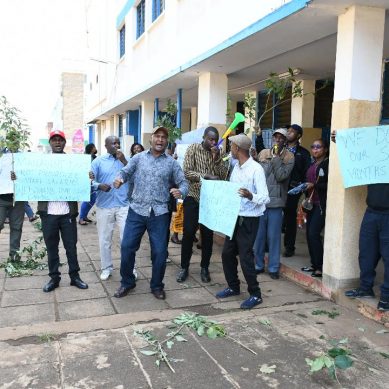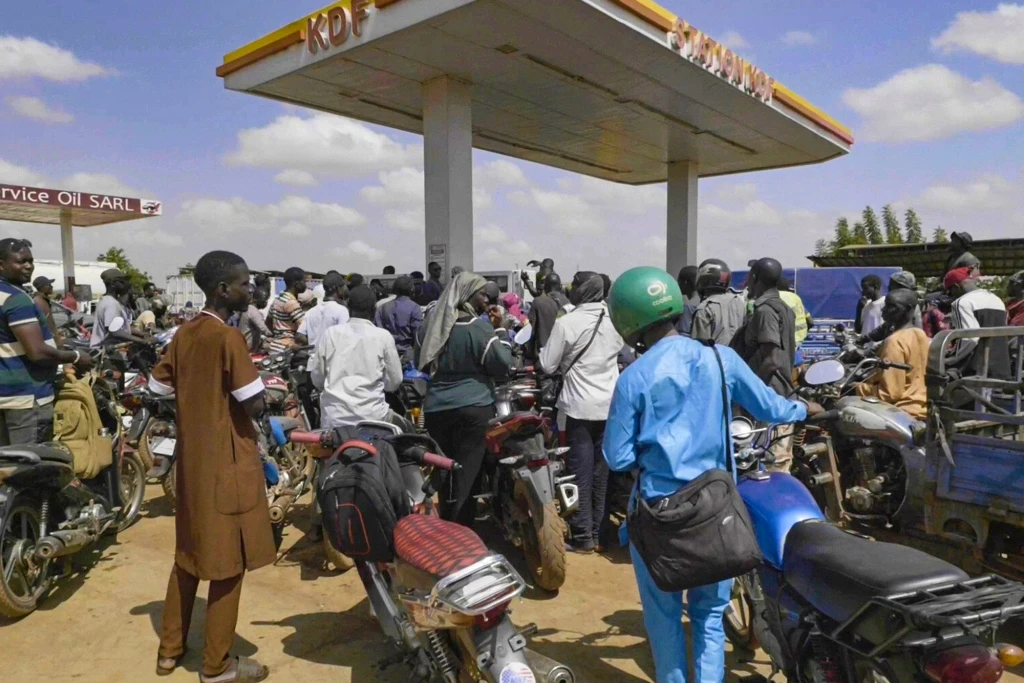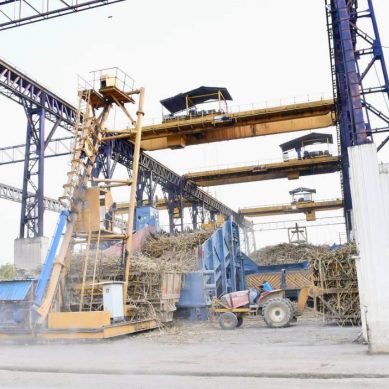
Two months before the blaze that razed down the Usindiso Building, members of Operation Dudula – meaning “force out” in Zulu – a group founded in 2021 with a stated mission to rid South Africa of illegal migrants – swept through the building, clad in their uniform of white T-shirts and combat trousers, demanding to see identification from foreign nationals, searching rooms for drugs and hitting some residents with whips, according to four witnesses interviewed.
Their accounts are corroborated by five separate affidavits submitted to the public inquiry. On the day after the fire, as dozens of shell-shocked and homeless survivors sat outside the building, about 30 members of Dudula arrived armed with whips, marched up and began taunting them, according to five witnesses and five affidavits.
“They were shouting, they were singing, they were having joyful laughter,” said Omari Hanya, 44, a Tanzanian survivor who was there. “’These foreigners must go back home or die’, they were saying in Zulu.”
Dudula’s Deputy Secretary General Isaac Lesole rejected the allegations that the group harassed or abused migrants in the block. He said the group’s code of conduct, allowed members only to ask if someone has legitimate visa papers, not to demand to see them. He disputed the charge of vigilantism, saying their role was always to alert legitimate authorities.
“Yes, in the past, we’ve been in trouble for acting on our own,” said Lesole. He acknowledged that Dudula members had threatened migrants and attacked their businesses in the past, but insisted the group now operates as whistleblowers within the law.
“Yes, there were members of Operation Dudula outside the Usindiso building following the fire, but it was not celebratory,” he added. The aim of the march was to highlight the problem of undocumented migrants and show Dudula had been vindicated in their belief that foreign nationals had taken over too many buildings like this in the town centre, he said.
Asked how authorities viewed Dudula, Home Affairs Minister Motsoaledi said that South Africa didn’t condone the group’s anti-migrant activities. “You don’t take the law into your own hands,” he added. “You don’t follow vigilantism because the country will go into chaos.”
The suspect in the fatal blaze, who is in detention and has been charged with 76 counts of murder and 86 counts of attempted murder, hasn’t yet entered a plea.
In March, the suspect’s attorney publicly stated that he intended to plead not guilty. Since then, the suspect fired his attorney for failing to show up at a court hearing to represent him and a new lawyer hasn’t been named, according to an official close to the case who requested anonymity to discuss the matter.
Munera Mokgoko, a South African from Northwest Province, met her 34-yeard old husband Idi Rajebo, in 2007 in Randfontein, a gold mining town west of Johannesburg, where he was running a grocery shop. Rajebo had arrived a year earlier by bus from the Tanzanian port city of Tanga. In 2019, they and their three children moved into the fourth floor of the doomed block.
“We had financial problems; it was cheap,” Mokgoko said outside the tin shack where she now resides. Her one-year-old daughter, Mymuna, giggled as she muddied her pink booties in the dirt.
The Usindiso building was formerly a shelter for women who were victims of domestic violence which closed in 2017 due to lack of funding. When Mokgoko and Rajebo arrived, it was being hijacked by criminal gangs charging “rent” to occupants and newcomers. It soon became crammed with desperate new arrivals, with the criminals and residents dividing its space by erecting tin shacks in bathrooms and on staircases, eight fire survivors narrated.
More than 500 people were living in the hijacked building at the time of the fire, about half of them migrants, according to law firm Norton Rose Fulbright, which represented 340 survivors in the inquiry. There are no official estimates.
The gangs could be brutal if you didn’t pay on time, said Simon, a Tanzanian friend of Rajebo’s who ran a kitchen on the ground floor. “They came in groups of five or six, with guns, usually a revolver,” he added. “I saw them beat someone with a bottle for being 200 rand ($11) short.”
The criminals openly preferred to rent to migrants, eight foreign residents said, because many were too scared to complain to police, since some were undocumented and others had already been extorted by officers.
Seven foreign fire survivors, including Hanya, said men in police uniforms with badges often raided their informal market stalls in and outside the building, asking to see their visa papers. If no valid document was produced, or sometimes even if one was, they said, the men often demanded sums of between 500 and 2,000 rand to avoid jail.
Four of those survivors described being driven off in a van to a quiet street to carry out the transaction. Two said they had been locked up in police cells until friends or relatives came with money to get them out.
Malawian street grocer Kenneth Jiro, 32, survived the fire but lost his 26-year-old brother Manis. He recalled having his stall raided every few weeks by men in police uniforms demanding 700 to 1,000 rand each time.
Xolani Fihla, a spokesman for the Johannesburg police (JMPD), said the department was not aware of any such misconduct by officers in its ranks, but that “it would be considered unlawful if it is happening, and if any evidence is brought to the JMPD then disciplinary action must be taken”.
The night after the fire, Rajebo was among 32 migrant survivors relocated by Johannesburg authorities to a pavilion in Hofland Park, a recreation centre in a leafy but rundown suburb just outside the city centre, six survivors said.
Hanya, a Usindiso survivor who runs a stall selling candy and cigarettes, said the shelter was overcrowded. There was “no privacy, no door on the toilet, barely anywhere to sleep – just a few mattresses,” he said. “People just sitting around waiting for food.” Soon after arriving, he elected to sleep on the street instead.
That proved a wise decision. On November 15, authorities raided the centre, forcing the 32 foreign migrants into security vehicles. The raid was witnessed by a Reuters reporter and cameraman.
Mokgoko remembers seeing Rajebo being hauled towards a group of police trucks and immigration vans outside. “He was with the baby. They were pulling him, saying, ‘You’d better give the baby back to the mother because you’re not going with them’.”
Rajebo handed the infant to Mokgoko, who watched her husband disappear into one of the vans.
Acting Gauteng Home Affairs Chief Albert Matsaung said at the scene that the officials were taking away the undocumented foreigners to be transported back to their home countries.
The 32 migrants were taken to a police station, arrested, fingerprinted and transferred to Lindela immigrants prison, 40km outside the city centre, according to Rajebo and Rashidi Suleiman Abdallah, 32, another Tanzanian who was detained. Their accounts were corroborated by law firm Norton Rose Fulbright and Lawyers for Human Rights, their legal teams, in an ultimately unsuccessful court case to fight their deportation.
On April 10, they were all deported, apart from seven who had escaped in a jail break in March, according to Rajebo, Abdallah and lawyers representing the 32 detainees. Most of the deportees were Tanzanian, with four Malawians.
When the Tanzanians landed in Dar es Salaam, they were detained until families could pay a fine to the Tanzanian authorities of 57,000 shillings ($22), levied against nationals returning after being deported. Rajebo got out after a week, when his relatives cobbled the money together.
The Tanzanian immigration department didn’t respond to requests for comment on the return of the deportees.
Rajebo said by phone on April 22 that if he wants to see his wife and children again, he has no choice but to return. Bringing them to Tanzania is not viable because of the lack of economic opportunities, he said, even though he thinks they would be far more welcome than he was in his wife’s homeland.
“I’m gonna come back,” Rajebo said. “I want a normal family. I don’t want to be separated from them.”
Even with the hostility he encountered in South Africa, he added, it is still preferable to the grinding poverty at home. South Africa’s annual economic output per person is $5,970, versus $1,220 in Tanzania, according to IMF data.
“You go there, you can make some money,” Rajebo said, chuckling softly. “That’s why we keep going.”
- A Reuters report







